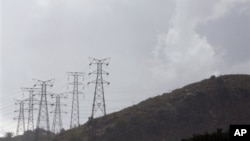President Barack Obama’s campaign to double the number of people in Sub-Saharan Africa with access to electrical power is picking up steam. As part of the Power Africa initiative, the Ethiopian government recently entered into an agreement with an American-Icelandic company, Reykjavik Geothermal, to construct a 1000 megawatt power plant. The Corbetti facility will be Ethiopia’s first independent power project in the country’s history.
Sub-Saharan Africa is a land of great promise and resources, such as timber, minerals, water and fertile soil. A key factor needed to develop these is lacking, however: reliable electrical power. Without this, businesses and economies cannot develop, and in many areas community life stops after dark.
According to the International Energy Agency – an intergovernmental research and advisory group based in Paris – sub-Saharan Africa will require more than $300 billion in investment to achieve universal electricity access by the year 2030. Greater private sector investment such as solar farm projects in Ethiopia and public-private partnerships will be necessary for sustained, equitable economic growth.
The new contracts follow awards made previously to support another project in Ethiopia to tap the Rift Valley’s geothermal resources to generate electricity; a wind energy project in Kenya; a hydroelectric project in Tanzania; and privatization and improvement of state-owned electrical facilities in Nigeria. Overall, the president’s Power Africa initiative commits $7 billion over the next five years to supporting these and other projects in six countries, which has leveraged $14 billion in private sector commitments.
The U.S. Export-Import Bank will support up to $5 billion more for American-made equipment used in the projects. Another billion dollars will be forthcoming from the Millennium Challenge Corporation to fund energy infrastructure, policy and regulatory reforms and institutional capacity building. Private interests have committed another $9 billion to develop energy projects under the initiative.
This all supports America’s vision for our partnership with Africa: cooperation that unleashes growth and the potential of every citizen.
Sub-Saharan Africa is a land of great promise and resources, such as timber, minerals, water and fertile soil. A key factor needed to develop these is lacking, however: reliable electrical power. Without this, businesses and economies cannot develop, and in many areas community life stops after dark.
According to the International Energy Agency – an intergovernmental research and advisory group based in Paris – sub-Saharan Africa will require more than $300 billion in investment to achieve universal electricity access by the year 2030. Greater private sector investment such as solar farm projects in Ethiopia and public-private partnerships will be necessary for sustained, equitable economic growth.
The new contracts follow awards made previously to support another project in Ethiopia to tap the Rift Valley’s geothermal resources to generate electricity; a wind energy project in Kenya; a hydroelectric project in Tanzania; and privatization and improvement of state-owned electrical facilities in Nigeria. Overall, the president’s Power Africa initiative commits $7 billion over the next five years to supporting these and other projects in six countries, which has leveraged $14 billion in private sector commitments.
The U.S. Export-Import Bank will support up to $5 billion more for American-made equipment used in the projects. Another billion dollars will be forthcoming from the Millennium Challenge Corporation to fund energy infrastructure, policy and regulatory reforms and institutional capacity building. Private interests have committed another $9 billion to develop energy projects under the initiative.
This all supports America’s vision for our partnership with Africa: cooperation that unleashes growth and the potential of every citizen.






